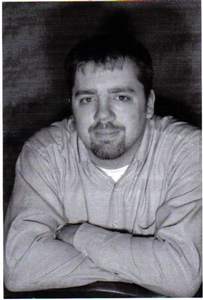The Warehouse Theatre is currently presenting Krapp's Last Tape as the first in their "On the Edge" series. I saw the Friday night showing.
This is considered Beckett's most accessible play, and the least absurd. The program inserts gave a great summary of the origin and goals of absurdist theatre, including the noncohesion of the movement. This play is more like a fishbowl than an absurdist play, though it certainly has all the elements of absurdism. The entire play takes place around midnight of Krapp's 69th birthday in his den. Every year on his birthday, Krapp records his recollections, revelations, and aspirations on a reel-to-reel machine and catalogs the spools. Tonight, he listens to one while waiting for his birthday to arrive, then records the titular spool.
Warehouse brought in an actor from Tennessee, a professor if my sources are correct, to play Krapp. There are lots of authentic and faithful ways to play Krapp: a clownish buffoon, a hyper-tragic character, a loser full of pathos, an everyman beginning the slide to senility and decripitude. Crosby Hunt hits all of those points masterfully. His acting was clean, direct, and exactly what the script calls for. The first third of the play is completely without words, and it would be easy for an actor to rush through the movements to get to the words. Mr. Hunt took his time, savoring each movement like his character savored the word "spool". His movements after the words took over the play were inconsistent with his character a couple times, but it rarely broke me out of the show.
I can't get away without mentioning the lighting. I have rarely seen lighting used so well. There are two moments in the script that call for Krapp to interact with lamps on stage, but the lighting served as set changes, characters to interact with Krapp, and as windows into Krapp's mental processes. Kudos to the designer and lighting tech(s).
Having seen other productions of this play before, I set myself a mental exercise to take every action by Krapp at face value, ignoring any attempt at symbolism and looking for evidence in the text that there is nothing absurd about what is happening on stage; the only absurdity is the world around Krapp outside his den. This was difficult to accomplish, as director Paul Savas (also the artistic and executive director of Warehouse Theatre) layered on the symbolism. This is not a criticism. The symbolism was never heavy-handed, and often innovative.
The performance space was wonderfully delicious. The next time I go I'll get some pictures; my batteries died so I got nothing for this post. All in all, this performance earns an enthusiastic recommendation from me. While not everyone has the constitution for absurdist theater, this production is a great introduction.
*I put new batteries in when I got home and took the pic of the programs.
Subscribe to:
Post Comments (Atom)







No comments:
Post a Comment